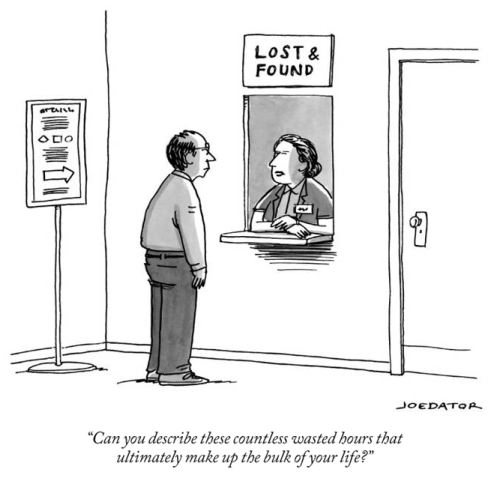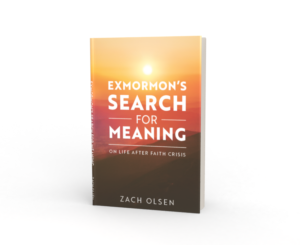Douglas Rushkoff in Throwing Rocks at the Google Bus:
“We have set in place an economic system whose growth works against our own prosperity.”
He explains that the central assumption of our economic lives — that further economic growth will create continually rising prosperity for all — is broken. Companies are designed to take money out of the system so in the end they vacuum up the playing field altogether, impoverishing the markets, consumers and employees–on whom they ultimately depend.
As we unfortunately absorb capitalistic principles into our daily lives, we also have inherited their flaws. One of them being the need to constantly grow. And just as much as it is unsustainable for businesses, it is equally unsustainable in our daily lives since we can never be certain whether we have achieved enough. The inevitable consequence is disappointment from endless ambition on the one hand, and bitterness when things don’t work on on the other.
Matt Haig explains wonderfully in his book Reasons to Stay Alive how our culture constantly threatens us to “improve.”
“The world is increasingly designed to depress us. Happiness isn’t very good for the economy. If we were happy with what we had, why would we need more? How do you sell an anti-ageing moisturiser? You make someone worry about ageing. How do you get people to vote for a political party? You make them worry about immigration. How do you get them to buy insurance? By making them worry about everything. How do you get them to have plastic surgery? By highlighting their physical flaws. How do you get them to watch a TV show? By making them worry about missing out. How do you get them to buy a new smartphone? By making them feel like they are being left behind. To be calm becomes a kind of revolutionary act. To be happy with your own non-upgraded existence. To be comfortable with our messy, human selves, would not be good for business.”
To achieve what Haig calls ‘the revolutionary act of being calm’ requires constraints. We tend to assume that “keeping our options open” means living with more freedom. Harry Emerson Fosdick provides an important context for freedom:
“Self-denial is not the negative, forbidding thing that often we shake our heads about. In one sense there is no such thing as self-denial, for what we call such is the necessary price we pay for things on which our hearts are set.”
One must choose to live up to standards based on one’s own judgment about what is good. Then when the world incites us to improve in some way we can interrogate those ideas and ask whether they are opportunities to exercise our values and, if they aren’t, we can be ready with the reaction, ‘Then it’s none of my concern.’ Within simple everyday things like working, walking outside, talking with people, bathing, and eating can be found all the opportunities to live according to chosen values and be fully awake, fully alive and fully human.
Self improvement has infiltrated all aspects of our lives as if to suggest that unless an activity is doing some kind of optimization or fulfills some end, it’s not worth doing. I like to think of meditation as just practicing ‘being’ — a time to attempt experiencing a reality deeper than goals, narratives, expectations and desires. But as Mike Powell in Meditation in the Time of Disruption points out, even meditation has been exploited to serve some kind of means.
“Whereas some come to meditation as a way of reckoning with the incredible gifts existence has already given them, others come because they want to see what else is in the bag. This sort of rhetoric only gets ramped up in reference to meditation as a performance booster. For example, the promise that meditation will make you more effective at work seems to have a lot more salience and motivational charge than the promise that meditation will just make work feel a little less important overall.”
“All told, this is a bleak picture,” writes Alexandra Schwartz in Improving Ourselves to Death, published in the New Yorker. She asks, “If the ideal of the optimized self isn’t simply a fad, or even a preference, but an economic necessity, how can any of us choose to live otherwise?” And then provides this answer:
“This isn’t a message of hopelessness. On the contrary, what it actually leads us towards is a better way of finding happiness. Once you realize that it’s all just an act of coercion, that it’s your culture trying to turn you into someone you can’t really be, you can begin to free yourself from your demands.”
Recognize the coercion being acted upon you and free yourself from your demands. Find things to do that will not improve you in any measurable way. Go for a walk in the woods. Think about the vastness of the cosmos. Go to a museum and look at art. Or read a book.
In The Bookish Life: How To Read And Why, Joseph Epstein explains how reading is one of those things that don’t need to be of concrete use in order to have value.
“What is the true point of a bookish life? Note I write “point,” not “goal.” The bookish life can have no goal: It is all means and no end. The point, I should say, is not to become immensely knowledgeable or clever, and certainly not to become learned. Montaigne, who more than five centuries ago established the modern essay, grasped the point when he wrote, “I may be a man of fairly wide reading, but I retain nothing.” Retention of everything one reads, along with being mentally impossible, would only crowd and ultimately cramp one’s mind. “I would very much love to grasp things with a complete understanding,” Montaigne wrote, “but I cannot bring myself to pay the high cost of doing so. . . . From books all I seek is to give myself pleasure by an honorable pastime; or if I do study, I seek only that branch of learning which deals with knowing myself and which teaches me how to live and die well.” What Montaigne sought in his reading, as does anyone who has thought at all about it, is “to become more wise, not more learned or more eloquent.” As I put it elsewhere some years ago, I read for the pleasures of style and in the hope of “laughter, exaltation, insight, enhanced consciousness,” and, like Montaigne, on lucky days perhaps to pick up a touch of wisdom along the way.”








